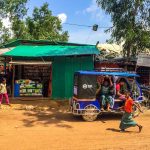
This workshop will be held on the 30 June 2021, from 10:00 am to 12:10 pm
if you would like to join, please contact Kaouther Kooli on kkooli@bournemouth.ac.uk
The COVID-19 pandemic and the subsequent worldwide restriction measures engendered deep economic, social, political and cultural crises that have shaped organizations’ actions and individuals’ behaviour. The textile and clothing industry, like many industries, has been severely hit by the outbreak of the coronavirus pandemic, which has challenged the fragility of the clothing supply chain. Garment factories in Bangladesh, Yangon, Myanmar in Tunisia, Egypt, Madagascar and Morocco well as many fashion and apparel retailers have been forced to shut, leading to the layoff of millions of workers.
Governmental restrictions, especially retail closures, also affected consumer demand for nonessential products and services, including fashion products. The fashion industry is also challenged by rising consumer environmental awareness, resulting in flight shaming and shunning plastic and making front fashion’s heavy environmental footprint front page news.
The disruption in the clothing and textile industry demands urgent and serious transformations. This workshop invites key stakeholders in the industry to discuss the impact of the COVID 19 crisis facing the industry and to suggest possible ways ahead. It aims to create a code of conduct and industry monitoring body as well as governance guidelines for practitioners on how to best manages the Covid-19 crisis, identify potential responsibilities and roles. A team will monitor the discussion and summarize at the end the key points.
A paper will be published in practitioner magazine : B2B Marketing magazine, the Bottom line (TBC)
A practitioner paper will be published in the Journal of Business to Business Marketing (Confirmed) authors not confirmed.
Programme
10.00-10.05 Dr Kaouther Kooli to open the event, introduce the issues, implications and the expected outcomes from the session
The practitioner session aims to identify key challenges and their challenges facing the industry during the Covid-19 crisis, what has been learned from this for business forecasting, responsibilities, accountabilities, environmental crisis.
10.05-10.15 Speaker 2 Dr Lilia Naas, Speaker 21 Lilia Naas, Chief Office for Arab States, International Trade Centre (UN), Economic Commission of Africa (TBC): the impact of Covid- 19 on (the Arab region/global) trade and ways to ensure good and bold recovery.
10.15- 10.25 Speaker 1 Dr Matthias Knappe, Programme Manager, GTEX
10.25- 10.35 Dr Yvette Ashby, Professional Clothing Industry Association Worldwide, PCIAW, UK.
10.35- 11.25 Covid 19 Impact: shared experiences from VanLaack Group, Sartex Group, VTL Group, FTTH, Ortho Group
Q&A 30 Minutes
11.55- 12.05 Speaker 5 Professor Merlin Stone : Managing mega-risks – the role of marketing, Merlin Stone, Principal, Merlin Stone Consulting and Visiting Professor, St Mary’s University, Twickenham, London, UK and the University of Portsmouth, Portsmouth, UK.
12.05- 12.10 Speaker 6, Dr Kaouther Kooli and Dr Nizar Aata, The impact of Covid-19 pandemic on sustainability practices in the textile and clothing industry.
Q& A
Participants
Academics
• Professor Merlin Stone, Portsmouth University, St Mary University, UK
• Professor Len Tiu Wright, De Montfort University, UK
• Professor Hamida Skandrani, the University of Manouba, Tunisia
• Professor Salma Damak, The University of Carthage, Tunisia
• Dr Nektarios Tzempelikos, Anglia Ruskin University, UK
• Dr Cherifa Lakhoua, The University of Carthage, Tunisia
• Dr Ediz Akcay, Bournemouth University, UK
• Sid Gosh, Bournemouth University, UK
Industry
• Lilia Naas, International Trade Centre (UN), Economic Commission of Africa (TBC)
• Matthias Knappe, Programme Manager, GTEX
• Mounir Zarrad (Commercial Director), Rashid Zarrad ( PR Director), Malek Zaguia (Marketing Communication Manager), SARTEX Group,
• Nacer Bouyahia, national coordinator of GTEX MENATEX Tunisia Project
• Nizar Ata, AYLAN Consulting.
• Rym Jlassi, Chair of the Tunisian Federation of Textile and Clothing Industry
• Ghazi El Bich, VanLaack, Tunisia
• (Others to be suggested)
Sources
Devnath A., 2020.European Retailers Scrap $1.5 Billion of Bangladesh Orders. Blomberg Reports, available at https://www.bloomberg.com/news/articles/2020-03-23/europe-retailers-cancel-1-billion-of-bangladesh-garment-orders, accessed on 15 April 2021.
International Trade Centre 2020. Impact of COVID-19 on T&C: Egypt, Madagascar, Morocco and Tunisia. Available at https://www.intracen.org/uploadedFiles/intracenorg/Content/Redesign/Projects/GTEX/08.12.20_Webinar_TextilesClothing_impacted_COVID19.pdf, accessed the 15 April 2021.
Fashion Revolution, 2020. The impact of COVID-19 on the people who make our clothes
By Fashion Revolution. Available at https://www.fashionrevolution.org/the-impact-of-covid-19-on-the-people-who-make-our-clothes/, accessed the 15 April 2021.
Labour Behind the Label 2020. Brands must urgently take steps to minimise impact of the coronavirus on garment workers’ health and livelihoods. Available at https://labourbehindthelabel.org/brands-must-urgently-take-steps-to-minimise-impact-of-the-coronavirus-on-garment-workers-health-and-livelihoods/, accessed 15 April 2021.
Majumdar, A., Shaw, M. and Sinha, S.K., 2020. COVID-19 debunks the myth of socially sustainable supply chain: A case of the clothing industry in South Asian countries. Sustainable Production and Consumption, 24, pp.150-155.
The times, 2021. “Why fast fashion could be set for go-slow” available at (https://www.thetimes.co.uk/article/why-fast-fashion-could-be-set-for-go-slow-3vf580cgm) accessed 15 April 2021.
Zhao, L. and Kim, K., 2021. Responding to the COVID-19 Pandemic: Practices and Strategies of the Global Clothing and Textile Value Chain. Clothing and Textiles Research Journal, 39(2), pp.157-172.
 Webinar on COVID-19 & GLOBAL Health
Webinar on COVID-19 & GLOBAL Health Conversation article: Three ways to ensure ‘wellness’ tourism provides a post-pandemic opportunity for the travel industry
Conversation article: Three ways to ensure ‘wellness’ tourism provides a post-pandemic opportunity for the travel industry 2021: More COVID-19 publications
2021: More COVID-19 publications BU research tackles global challenges – Rohingya refugee crisis (Bangladesh)
BU research tackles global challenges – Rohingya refugee crisis (Bangladesh)










 Upcoming opportunities for PGRs – collaborate externally
Upcoming opportunities for PGRs – collaborate externally BU involved in new MRF dissemination grant
BU involved in new MRF dissemination grant New COVID-19 publication
New COVID-19 publication MSCA Postdoctoral Fellowships 2024
MSCA Postdoctoral Fellowships 2024 Horizon Europe News – December 2023
Horizon Europe News – December 2023